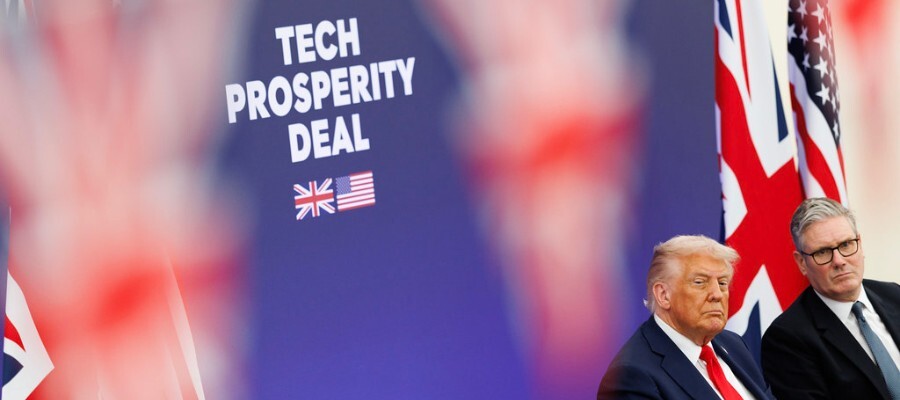.jpg)
What does the Tech Prosperity Deal mean to global digital leaders?

Mark Chillingworth
The UK-US Tech Prosperity Deal
The UK-US Tech Prosperity Deal marks one of the largest US commitments outside its borders. For digital leaders, it offers opportunities in research, jobs, and global influence; it also raises concerns about over-reliance on American tech giants.
Lauded by its signatories, the Tech Prosperity Deal between the UK and USA will have an impact far wider than these two anglophone nations. Signed during the second state visit to the UK by President Donald Trump, the $30 billion spending package is said to be the largest investment outside of the USA. It could drive international benefits in research, or it could make the UK over dependent on the US and hinder it from forming close trading relations with global and European partners.
Tech Prosperity Deal: Overview

TDLR
During Trump’s UK visit, $30 billion in spending was announced, with the single biggest investor being Microsoft, but also included CoreWeave, Google, NVIDIA and OpenAI. Central to the investment is the building of AI infrastructure, such as data centres, and a pact to jointly research the use of AI for medical treatments and fusion energy.
Tech vendors, the Labour Prime Minister Sir Keir Starmer, and President Trump all heralded the deal as a significant economic and technological development.
The tech deal
According to the statement from the UK government this is a big tech deal that will “speed up world-leading AI research”, as well as “ushers in a golden age of nuclear technology.”
In the North East of the UK, an ‘AI Growth Zone’ will provide 5,000 jobs. This all sounds grand, though on the first two points there was little detail. In partnership with private investment groups, the AI Growth Zone sees a deal between British tech firm Nscale, and the US AI firms NVIDIA and OpenAI to deliver Stargate UK. This is the first overseas installation of Stargate, which President Trump agreed with OpenAI and NVIDIA, and others, following his inauguration. This could be seen as a major win for the UK over its European neighbours and other economies. However, as we will see, building and housing Stargate UK may not be without its own challenges.
The trade association for the UK’s tech industry, Tech UK, is largely positive about the deal stating: “The deal explicitly envisages shared infrastructure and compute access, which could help British researchers and startups tap into larger datasets or compute capacity than might otherwise be feasible.”
“As many countries race to set standards and capture leadership, being in lockstep with the US gives the UK sector credibility and influence,” TechUK says. It could be argued that the UK already has credibility and influence, the nation’s FinTech sector is thriving, while the island is home to a plethora of well regarded boutique tech firms, and major software firms such as Sage and The Access Group, where HotTopics community member Conor Whelan is CIO.
The fanfare
Perhaps the UK’s tech leaders are too British, because the world was treated to a week of the most powerful men in tech lauding the deal and the UK.
“We are at the Big Bang of the AI era - and the United Kingdom stands in a Goldilocks position, where world-class talent, research and industry converge,” said NVIDIA founder and CEO Jensen Huang.
Sam Altman, CEO of OpenAI said: “This partnership reflects our shared vision that with the right infrastructure in place, AI can expand opportunity for people and businesses across the UK.”
Plaudits of a similar nature came from Microsoft Chairman and CEO Satya Nadella, Marc Benioff of Salesforce, Ruth Porat of Google and James Seppala, who heads the European arm of investment firm Blackstone.
Concerns about the deal
Signatories to a deal will always wax lyrical. Fellow in AI and Human Decision Making at the University of Salford, Richard Whittle believes the deal could make the UK over reliant on US tech.
When this point was put to our community they replied that in many economies technology leaders are heavily reliant on the US. When it comes to hyperscaler provision, the dependency is deeply rooted.
Other economies may benefit from this tech deal, as the UK becomes home to major US infrastructure it could lose its lead as a creative nation that allows start-ups to flourish. The US will also be able to move the problems that AI’s resource hungry infrastructure demands away from their own shores. All nations, bar the UK, could benefit from having access to AI power, but without upsetting their residents as energy demand skyrockets and water supplies are disrupted. US regions with a proliferation of data centres are reporting that promised levels of employment have not been met.
Since coming to power in the summer of 2024, Sir Keir Starmer has been courting both the US and nearby and the most important trading partner the EU for better deals. Will the Tech Prosperity deal risk that?
Not according to Will Venters, Associate Professor of Digital Innovation at the London School of Economics.
“Developing better UK/US technology relations may benefit trade with the EU European AI industry through increased collaboration,” he says.
“I hope this deal will be about raising all boats - indeed the manufacturing excellence in Europe may align well with the focus of the UK/US deal.” Sabina Ciofu, International Policy and Strategy Lead at TechUK agrees and adds: “The EU and the US are the two biggest markets for UK tech. We support the government’s policy of engaging in tech and trade cooperation with both. The Tech Prosperity Pact is a memorandum of understanding which signals an intention for closer cooperation in emerging tech. With the EU, we have a free trade agreement, with strong provisions on digital trade, that’s a legally binding international treaty. They are not mutually-exclusive, but complementary.”
“I hope this deal is about focusing on the deeper and potentially more important AI possibilities than the current obsession with LLM based tools for the enterprise. The potential of GenAI in design, robotics, manufacturing, healthcare, software engineering and agential services are likely much more economically significant than LLM based chat-bots, note taking, meeting summary type AI tools that enterprises are currently deploying and seeing low RoI from,” Venters says.
Beyond the hype there is potential for the UK to win back its technological economic spurs that were lost in 2016, but there are risks for technology leaders and the UK. Only through transparency and working on the real opportunities for value from AI will everyone benefit from these sizable deals.
SUBMIT A COMMENT
RELATED ARTICLES
Join the community
To join the HotTopics Community and gain access to our exclusive content, events and networking opportunities simply fill in the form below.